WASHINGTON — Tucked into the $1.3 trillion omnibus budget deal released late Wednesday are provisions to expand mental health care access for veterans with other-than-honorable discharges, in an effort to prevent more veteran suicides.
If the bill becomes law later this week — and it has to by Friday at midnight, or lawmakers will trigger a partial government shutdown — the provisions will ensure mental health screenings and care for veterans with so called “bad paper” dismissals.
Individuals with bad conduct discharges or court-martial convictions will not be eligible.
Advocates called the measure an overdue change that will help save lives.
“For far too long we’ve seen veterans whose service was overwhelmingly honorable, but were denied help from the [Department of Veterans Affairs] for a lifetime over administrative separations,” said John Rowan, president of Vietnam Veterans of America.
“This provision of the omnibus will help veterans from the Vietnam war, to the current forever wars and future conflicts, and save so many of the untold lives of countless forgotten heroes.”
RELATED

The changes are based largely on legislation sponsored by Rep. Mike Coffman, R-Colo., which passed the House last fall.
The issue of other-than-honorable discharges has received extra attention on Capitol Hill in recent years as lawmakers learned of cases of veterans who were kicked out of the ranks without military benefits due to issues like undiagnosed brain injuries, military sexual trauma or recurring post-traumatic stress disorder.
VVA officials estimate as many as 300,000 veterans nationwide may have been improperly dismissed from the service, leaving them more vulnerable to depression and suicide because of a lack of veterans health services.
Last summer, VA officials changed their policies to allow veterans with other-than-honorable discharges to access department emergency rooms for urgent mental health care for 90 days of treatment. The moves also included provisions to help those veterans appeal for discharge upgrades, making them eligible for additional help.
The omnibus provisions go even further. They require a mental health screening for all veterans with other-than-honorable dismissals before their departure, and guarantee future mental health support for veterans who served at least 100 days on active duty, experienced sexual assault or trauma while serving, or worked as a drone operator.
Veterans will receive care at VA facilities or, if deemed appropriate by a medical provider, at private-sector medical officers. Unlike last summer’s changes at VA, there is no expiration date for the treatments.

The measure also calls for VA to provide information on eligibility to affected veterans within six months of the new law’s passage, to include a new hotline where individuals can call for information. Officials will also have to track usage of the care and report back details to Congress.
Kristofer Goldsmith, founder of High Ground Veterans Advocacy, which has long focused on the bad paper issue, called the reforms “a major shift towards justice for those veterans who have for so long been denied it.”
Rowan said the provisions were championed by Coffman and Beto O’Rourke, D-Texas, in the House, as well as Democratic Sens. Brian Schatz of Hawaii, Chris Murphy of Connecticut and Jon Tester of Montana.
He also praised VA Secretary David Shulkin for his advocacy on the issue in recent months, saying that helped highlight the need for changes.
VA research shows roughly 20 veterans nationwide commit suicide each day. Of those, about 14 are individuals with no access to VA health services or regular interaction with the department.
Shulkin has said reaching out to those veterans is key to bringing down the number of veterans who take their own lives.
To contact the Veteran Crisis Line, callers can dial 1-800-273-8255 and select option 1 for a VA staffer. Veterans, troops or their families members can also text 838255 or visit VeteransCrisisLine.net for assistance.
Leo covers Congress, Veterans Affairs and the White House for Military Times. He has covered Washington, D.C. since 2004, focusing on military personnel and veterans policies. His work has earned numerous honors, including a 2009 Polk award, a 2010 National Headliner Award, the IAVA Leadership in Journalism award and the VFW News Media award.





